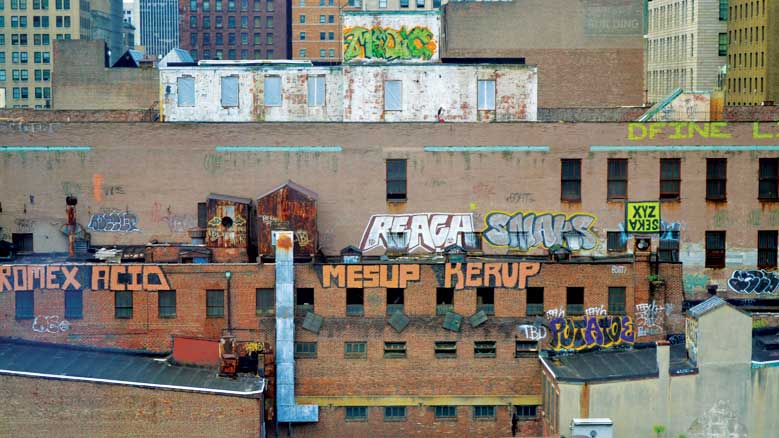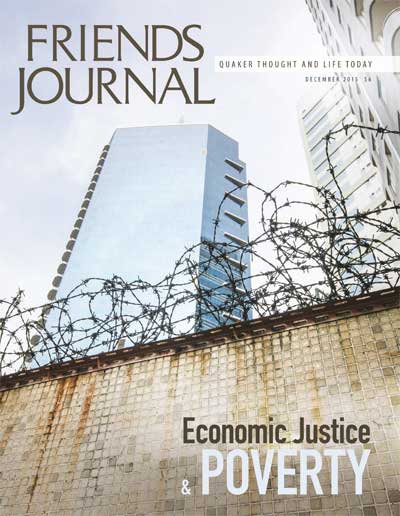
Are Friends really addressing issues of poverty in our communities? This is a painful question. What does it mean for Friends to address these issues? Is it enough to form mass incarceration committees or to sit in on Peace and Social Justice Committees once a month? Does forming reading groups to discuss The New Jim Crow by Michelle Alexander mean that these issues are being addressed?
The answers are disconcerting; they bring up so many more questions.
So what does it mean to really get out of your comfort zone, to make friendships and alliances with others of a different class and race? How many Friends form necessary relationships to make a meaningful impact? How many Quaker schools are extending life-changing education to students from impoverished neighborhoods? How many yearly meetings are truly impacting communities hit hardest by poverty?
Asking such questions goes to the heart of what it means to be a Friend: to talk less, do more, and truly live the principles of Quakerism.
The poverty afflicting communities of color goes back centuries. It is a disease which began in racist thought and instincts and thrives in a system of white privilege that has been the hallmark of the dominant culture since this land was first colonized.
Mass incarceration has its roots in the post-slavery oppression of African Americans. Racism and economic oppression have long been intertwined, used as a tool in our society to control the lives of millions of its darker citizens. In communities of color across the United States, entrenched economic barriers and second-class citizenship have led to two separate, unequal societies. They have created a chasm between the wealthy few and the utter despair of the many. If Quakers are to be relevant in this time, they must learn to answer the painful questions. If they are to involve themselves in the critical issues of our time, they must make a true commitment.
What should be the criteria for judging the effectiveness of our strategies for addressing poverty in our communities? The following might be considered:
- a meeting helping ten African American families out of poverty
- a Friends school enrolling students from families who cannot afford a Quaker education
- a Quaker organization, such as American Friends Service Committee, allying itself with and funding grassroots organizations fighting poverty
- yearly meetings investing in the communities in which they live
In the last two years, I have heard many impressive speeches at Philadelphia Yearly Meeting’s annual sessions. I have been enthralled by the flow of progressive dialogue that seemed to cut to the heart of what needs to be done to tackle devastating issues. I have sat in a conference at Arch Street Meeting House that was devoted to overcoming racism. There were calls to use portions of Quaker endowment funds to invest in community green projects that would benefit those neighborhoods.
I have participated in conferences to support the ministries of Friends engaged in community work. One young Quaker of color gave a presentation that was both memorable and powerful. He said, “It should not be what Friends invest in, but whom they invest in!” He harkened back to a time when people invested in their own neighborhood: in those they knew and wanted to see succeed. That is the only way to truly build a community.
It seemed as if I could hear the voices of Quakers past, their spirits floating above us. I have listened to ministry that rises out of the silence from Friends whose hearts are filled with caring and who want to do the work necessary of building.
But the reality remains a simple one: to address issues of poverty, we need more than a moral commitment and more than Sunday messages, evening committees, and endless talk. Poverty will not be allayed by theory or pretty words. It needs financial resources if it is ever to go away. The suffering in our neighborhood grinds on each day; in meetings and churches, the devout still ponder.
Poverty is not a therapy session: one cannot talk one’s way out of it. And after some time, the endless words begin to ring hollow.
It is true that Quaker actions are rooted in consensus, and therefore the meeting moves slowly. But suffering doesn’t. It is time that Quakers come together to support not just concepts and ideas but real and tangible things: economic proposals, green technology, funding for small businesses, entrepreneurship that empowers families and strengthens communities, creative projects that will actually change the way hundreds of families within a 20-block area think and live.
Such work is not impossible. It has been done and is now on-going. There are neighborhoods we can look at—communities undergoing vibrant changes due to well-financed programs—succeeding in places that are not far away.
Then why are we still waiting?
Failing to address poverty in meaningful ways is to give lip service to our conscience, so that we can better ignore it. It is to use Quaker principles and thought as mere decoration. It is akin to driving through poor neighborhoods with our windows and sensitivity rolled up tightly, while trying to think right thoughts.
It is not enough to acknowledge white privilege. It is not enough to discuss poverty in the abstract; that is just another form of denial. As Quakers we must live our principles. We must reach out with our hands, because in the end, it is only our actions that will define who we truly are.




Please help the public school kids. Drop books for their libraries. Ruby said recently their weren’t enough books for the kids to check them out at John b. Kelly elem in Germantown. Volunteer even one day as a chaperone for a field trip. Let the gfs and penn charter teens spend more time reading with the Kelly kindergarteners so they can learn to love reading.
There are so many small things that can be done that have a wonderful & long lasting impact. The tutoring of children is foremost among them. When you take a few hours out of your week and devote it to shaping the mind of a child, you have no idea how profound an impact that can have. It is hard to know what is going on inside the mind and life of a child and often they don’t or won’t say. But love and time and attention cause children to blossom and reach out toward their potential.The John B Kelly school in Philadelphia, a school in your neighborhood, our after-school Drop In Center, are all places in need of the kind and considerate efforts and the time of volunteers.
Teaching a child to read, teaching a child to think, opening their minds to the greater world around themselves is a thrilling job. Volunteer, you may love it!
Peace Power Love & Respect
Jondhi
Thank you, Jondi! You truly speak to my condition! What I’ve done, in moving to Vietnam and working as a volunteer physical therapist for the past ten years is certainly not a path that many would choose to follow. There is, however, such an enormous gap between talking and doing in the cases of many well-meaning individuals that it is quite depressing to contemplate.
Thanks for a great piece.
J. Jondhi, do you have some favorite examples of “creative projects that will actually change the way hundreds of families within a 20-block area think and live”?
I ask because I struggle to find good examples of projects that provide transforming access to resources and opportunities in a sustainable manner on a large scale like a 20-block area. Having good examples would be helpful to me personally and in terms of considering the merits of various proposals that get floated for different richmond neighborhood.
Jondhi, you become more eloquent by the day.
As a public librarian in Nicetown I see how much one-on-one contact can impact children who might otherwise struggle. Sometimes their parents are absent, sometimes overwhelmed, many times under-educated. The support of a welcoming teen or adult who listens and tries to provide whatever assistance that child needs can turn a child around. Nurturing. Public schools with classes of 25 or 30 students cannot provide individualized instruction or mentoring and many families are not well equipped to do so.
We need to weave social fabric from one neighborhood to another. Adopt a program a library, a group of children or adults. Do you have any idea how hard it is to find reading tutoring for adults? If you feed the parent, you feed the child. It follows. Teach chess, teach sewing, gardening whatever your skill set is, share it.
Peace and love in the New Year.
Everyone loves to endlessly talk and talk, lament and bemoan. There is a simply, quick solution to mass incarceration and all the collateral damage to families and communities.
All people who truly care have to do is ‘demand’ just one hearing in Congress or a state legislature where European officials can explain their freer, more just and effective crime and drug laws. All the facts 100% evidence that if this ‘FREEST, MOST JUST NATION TO EVER EXIST ON EARTH’ were to TRY their laws 90%+ of U.S. prisons would close and innocent lives would be closed, streets made safer, etc.
Americans would also save about $100 billion per year in reduced crime costs, lower taxes, etc. All that money saved could then go to education, rebuilding communities, drug rehab, etc. All the facts are out there.
I’ve been a court labeled, “socio-politico activist” since the 60s. In all my years of advocating for just one hearing I have yet to find even one ‘caring’ politician, rights attorney, rights org, et al—-Black, White or Hispanic—-that will ever call for just one hearing. The silence is deafening from all. All those who truly care should start ‘demanding’
just one hearing. What harm could it do???
For MLK, Mr. Garner, Mr. Gray, Laquan, Tamir, et al
Xu.s.neoslavery@gmail.com
henry, a White nobody
Smokin’!
I loved your article.
I hope it gets us out of our heads and into action.
Thank you.